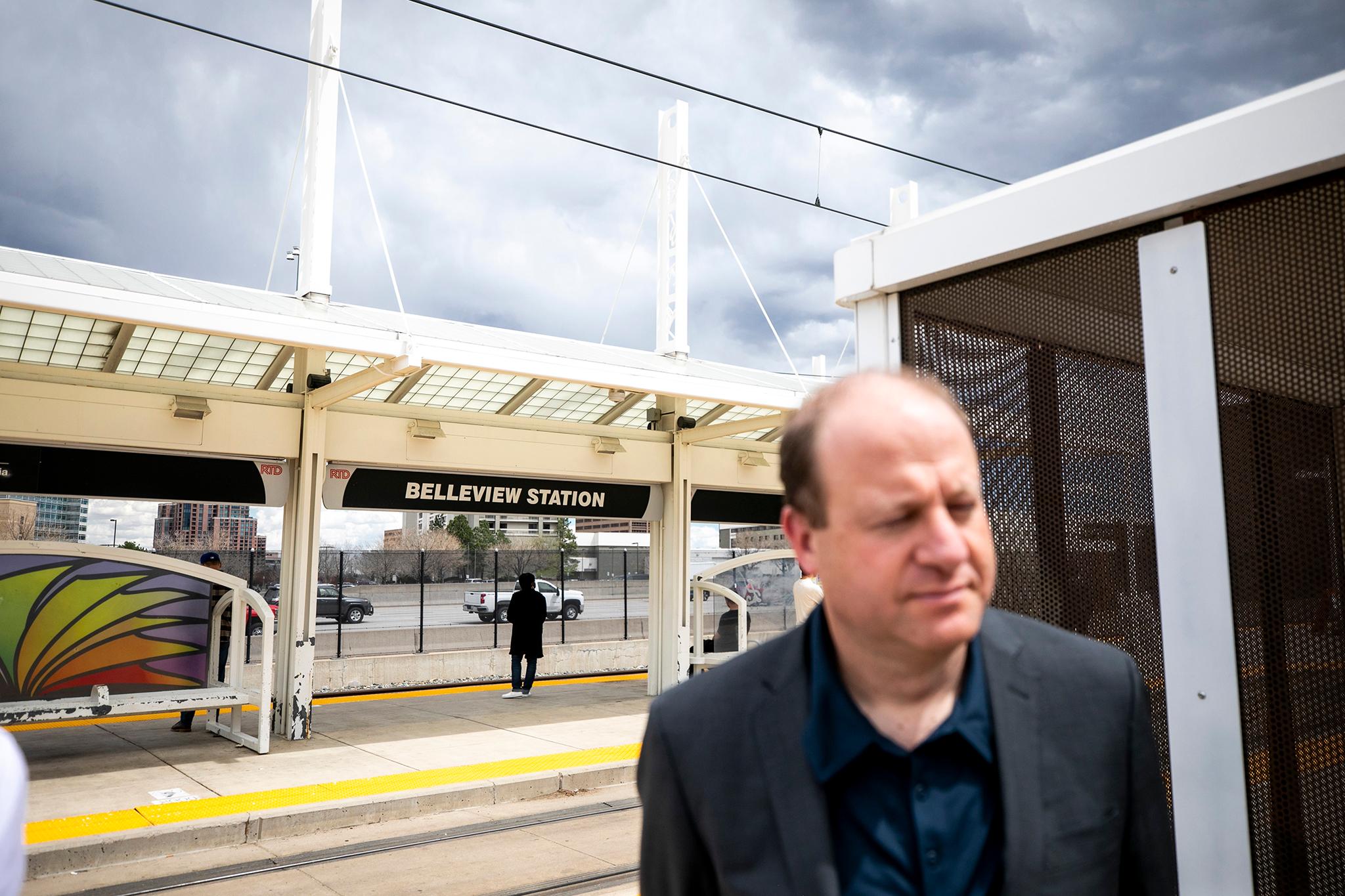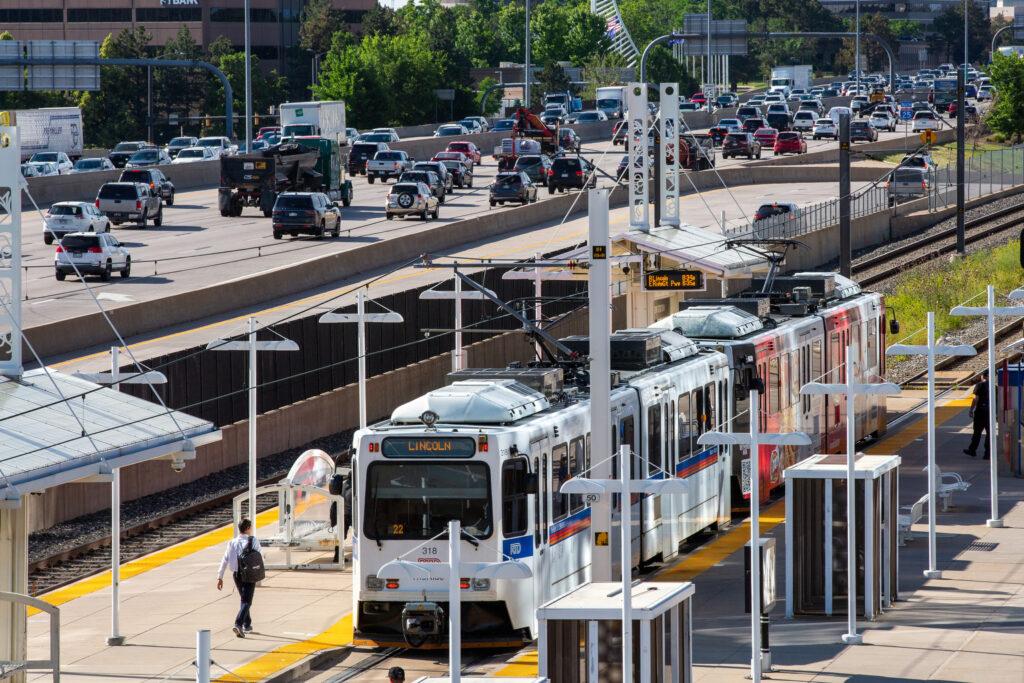
Gov. Jared Polis will meet with and endorse several candidates running for the Regional Transportation District’s board of directors, CPR News has learned.
RTD board races are typically sleepy affairs, sometimes attracting just one — or occasionally zero — candidates and relatively few campaign contributions.
Polis, however, has made housing and transportation top policy goals in his second term. He’s signed bills recently that boost housing density in transit corridors, limit local parking requirements, and legalize accessory dwelling units across the state.
More frequent and more reliable public transit is key to making the governor’s vision of a denser, more affordable Colorado a reality. The state will also soon send tens of millions of new dollars to transit agencies across Colorado, including RTD.
But the effort to reform the state’s largest transit provider, RTD, which would have given the state more power over it, failed in the legislature’s waning days. Legislators say they will try again to run an RTD reform bill.
Polis’ pending endorsement of candidates, however, shows the governor has found another way to exert influence over RTD. He intends to support candidates who are committed to expanding bus and train service, CPR News has learned.
Eight of the 15 seats on the RTD board will be on the ballot this fall. More than a dozen candidates have qualified for those races.
One candidate with close ties to Polis is running in the central Denver RTD race.
Kiel Brunner is one of three candidates running for District A, which covers downtown Denver and other central neighborhoods. He met his now-wife, Danielle Oliveto, while working on Polis’ first campaign for Congress in 2008. Oliveto is now Polis’ deputy chief of staff.
One of Brunner’s opponents, Chris Nicholson, told CPR News that he learned that Brunner’s candidacy, “was something where the governor's office had decided to get involved.”
Nicholson declined to say how he learned that. And Brunner denied the claim, and also denied that he’d be a rubber stamp for Polis, saying that he decided to run for the board out of climate and air quality concerns — and his 3-year-old son’s future.
“One of the hardest things I've had to do was to teach him how to use an inhaler and try to explain why he was having problems breathing,” Brunner said. “Our air quality here in Denver is bad and the inhaler helped, but it's not really a long-term solution for our climate future. I think we need to make RTD a meaningful part of our climate solution.”
Brunner, who is a data scientist for global accounting giant Deloitte and has a background in progressive campaigns and causes, described himself as only an occasional RTD user. Walking and biking, he said, are typically faster ways to get around his Capitol Hill neighborhood and nearby destinations. He’d like to change that, he said.

A spokesman for Polis did not directly answer CPR News’ question about whether the governor is behind Brunner’s campaign.
Instead, the spokesman sent a statement on Polis’ behalf saying the “stakes could not be higher” for voters who will choose board members “who will do the work to combat catastrophic climate change, increasing service where and when people need it, and to saving Coloradans money.”
“I have known Kiel for many years and am excited that someone of his talent is stepping forward to run,” Polis said in the statement.
Nicholson, who has the endorsement of the main RTD drivers’ union, prominent local politicians including Denver Mayor Mike Johnston, and several city councilors and state representatives, said he is also a long-time Polis supporter.
He said he agrees with Polis on top issues like Front Range Passenger Rail, finishing the long-delayed B Line to Boulder and Longmont, and improving RTD’s ridership numbers.
“It's understandable to me that the governor wants to ensure that the board is moving in a good direction and is making the kinds of changes that he believes in,” Nicholson said. “If I've made any mistakes so far, it's in doing a bad job convincing him and other people that I have anything less than a complete agreement on those goals.”
But while Nicholson may agree with Polis on goals, he disagreed on methods.
He, along with some current and former RTD board members, the Denver City Council, and others, were vocally opposed to the RTD reform bill’s most controversial provision that would’ve cut most of the board’s elected seats, converted representation from smaller districts to one at-large district, and allowed the governor to appoint two members.
One of the bill’s sponsors, state Rep. Meg Froelich, D-Cherry Hills Village, said the discussion around the bill, “was just a bad experience for a whole host of reasons. The quality of the engagement was not one that I want to repeat.”
The bill would also have raised director’s pay, set up a driver training program and require a third-party study on the district’s size and ways to improve service, among other changes. But the proposed board changes dominated the conversation and ultimately helped kill the bill, Froelich said.
Froelich also suggested that state leaders are taking a sharper interest in upcoming RTD board races.
“I think there’s interest from a lot of folks in supporting candidates who are willing to support transit reform,” she said.
The third candidate in the District A race, Bob Dinegar, said between the big names apparently backing his opponent he was the “likely underdog.”
“I’m running for RTD’s Board because public transit is as important to people’s lives as hospitals, libraries, schools and jobs,” he said. “I care deeply about this.”









